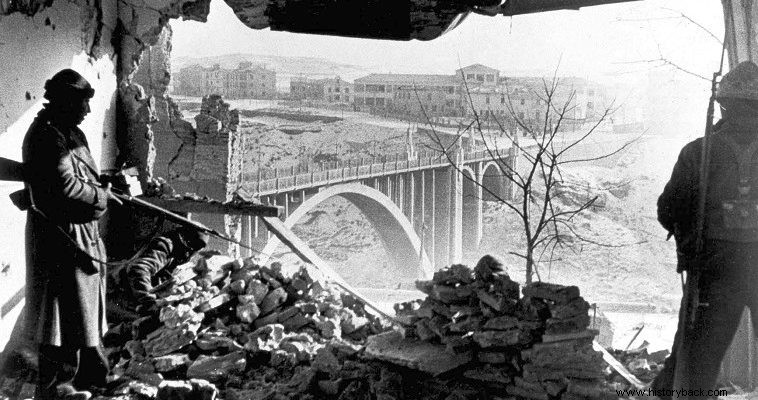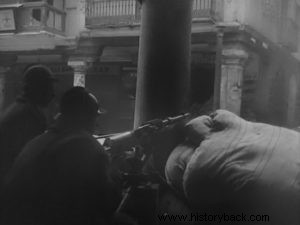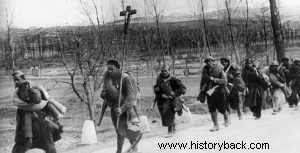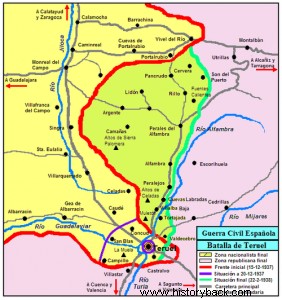
The Spanish Civil War began as a movement of the military against the Popular Front government but evolved into a regular war between two states, with the participation of many others on one side or the other.
By the end of December 1937 the tide had begun to tilt in favor of Franco's Nationalists. The tragic, from a military point of view, management of the war by the Democrats also contributed to this.
The Catastrophic Strategic Mistake
Having suffered terrible bleeding in previous battles mainly due to incompetence, the Democrats insisted on devastating attacks. The republican army, reinforced with new Soviet weapons, which arrived via France, would try its luck once more. The target would be the small town of Teruel, which was on a salient of the nationalist front in Aragon . Teruel was not a serious strategic objective.
But it was chosen for the event of the attack because the democrats had verified information that the nationalists were preparing a major attack in Guadalajara again, a little further west of Teruel. During this period, democracy was at its limits. He didn't have the luxury of mass attacks leading to hundreds of casualties and the loss of material. Already after Brunete, the nationalists had become so strong that the defeat of democracy was now a matter of time.
Time was precisely the best ally of the democrats. They had to buy as much time as possible, in the hope that it would not be long before the new European war broke out , which everyone saw coming.
In this context, the democrats had to act, applying the tactic of flexible defense and excluding the conduct of any large-scale offensive operation. And yet the democrats didn't do just that. For political reasons alone, "to show the world that democracy is alive and strong", it was decided to launch the attack on Teruel.
The republicans assembled for the attack 100,000 men, who would be supported by all available aircraft and tanks. The latter were scattered among the infantry units, as instruments of direct support and not as instruments of shock. Their forces were organized into two armies, those of the Levant and the East under the general command of Juan Hernandez Saravia.
The Democrats are charging
On December 15, 1937, in the midst of heavy snowfall, the republican troops stormed out. The nationalists, also because of the weather, were taken by surprise and did not react. The Republican 22nd and 18th Army Corps bypassed the city and established themselves defensively west of it. The blow to the nationalists was naturally, strategically, negligible.
Franco, however, in order to deprive the republicans of even their false laurels, abandoned the attack on Guadalajara and ordered his forces to retake Teruel and release its detached garrison.
The commander of the Nationalist Guard, Colonel Domingo Rey d'Arcourt , unable to contain the strong republican forces, ordered his divisions to enter the city itself, where they besieged it. It had between 2,000 and 6,000 men (depending on the source) many of whom were civilians.
The besieged fought heroically from building to building and were gradually confined to the center of the city. Despite the relative proposals of their opponents, they refused to surrender. But they could not hold on indefinitely.
Rescue attempt
Due to the bad weather the Nationalist forces were unable to move fast enough and worst of all the bad weather grounded their air force. Only on December 29 did the nationalists manage to fight back.
After a heavy bombardment of the democratic positions, especially on the "Tooth of Teruel" hill, ten nationalist divisions rushed out. Two days later, however, the snowstorm returned, imprisoning the Nationalists again.
Franco tried to encourage d'Arcourt, but he had no choice but to surrender on January 6, 1938, with those of his men still alive. . However, the battle was not over. The nationalists continued their attack.
On January 17, 1938, they broke through the democratic front and occupied the "tooth". The Democrats, unfortunately for their soldiers, following foolish doctrines and practices, decided to fight back. The counterattack was launched on January 25th and lasted until the 27th.
If the attack on Teruel was a strategic mistake by the Democrats, this particular counterattack should be characterized as a criminal mistake. The men were sent to attack without ammunition, with bayonets and those who refused to attack were executed on charges of cowardice. The natural next step was for the "counterattack" of the democrats to fail.
The only hope of the Democrats was immediate folding. However, reasons of prestige did not allow it. Political leaders of the republic and foreign personalities close to it spoke of the "great victory of the Republic". How could they be refuted?
On February 7, the nationalists launched their own counterattack and broke up the democratic front. General Monasterio's Cavalry Division pursued the fleeing republicans "like hares", according to the testimony of a British legionnaire.
With desperate efforts the democrats threw into the battle their last reserves and restored the cohesion of the front. The power of the nationalists, however, was now non-negotiable. On February 18 the city was surrounded by the Nationalists, but only on February 20 did the Democratic administration order a retreat!
On February 22nd those republicans who could were forced to abandon Teruel and return to their lines of advance. Losses on both sides were heavy. The nationalist forces who counterattacked 14,000 dead, 16,000 wounded and 17,000 men frostbitten and missing. In the initial phase of the battle the Nationalists lost 9,500 men.
The democratic counterparts, however, were even heavier, reaching 85,000 men, many of them prisoners. In addition to the human losses, valuable material was lost that was destroyed or captured by the enemy. And yet the democrats didn't even have reason to attack Teruel. Politics had cost the Democrats dearly.

Democrat machine gun element in Teruel.

"Karlists" of the Nationalist army are marching towards the city.

